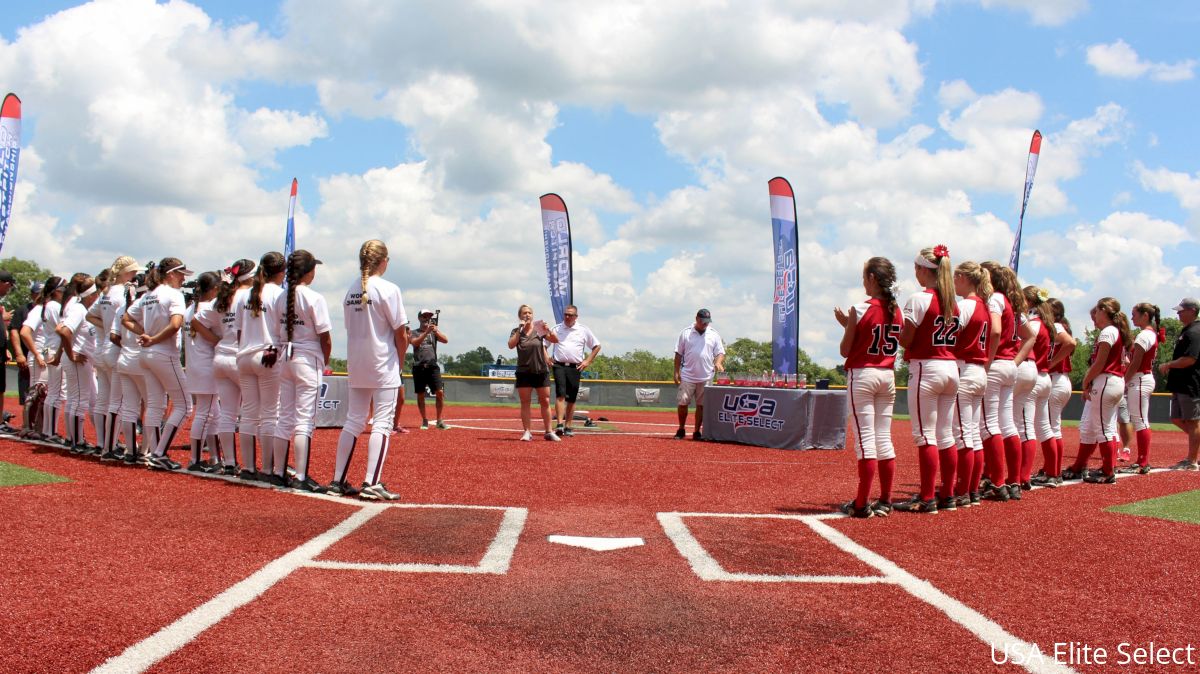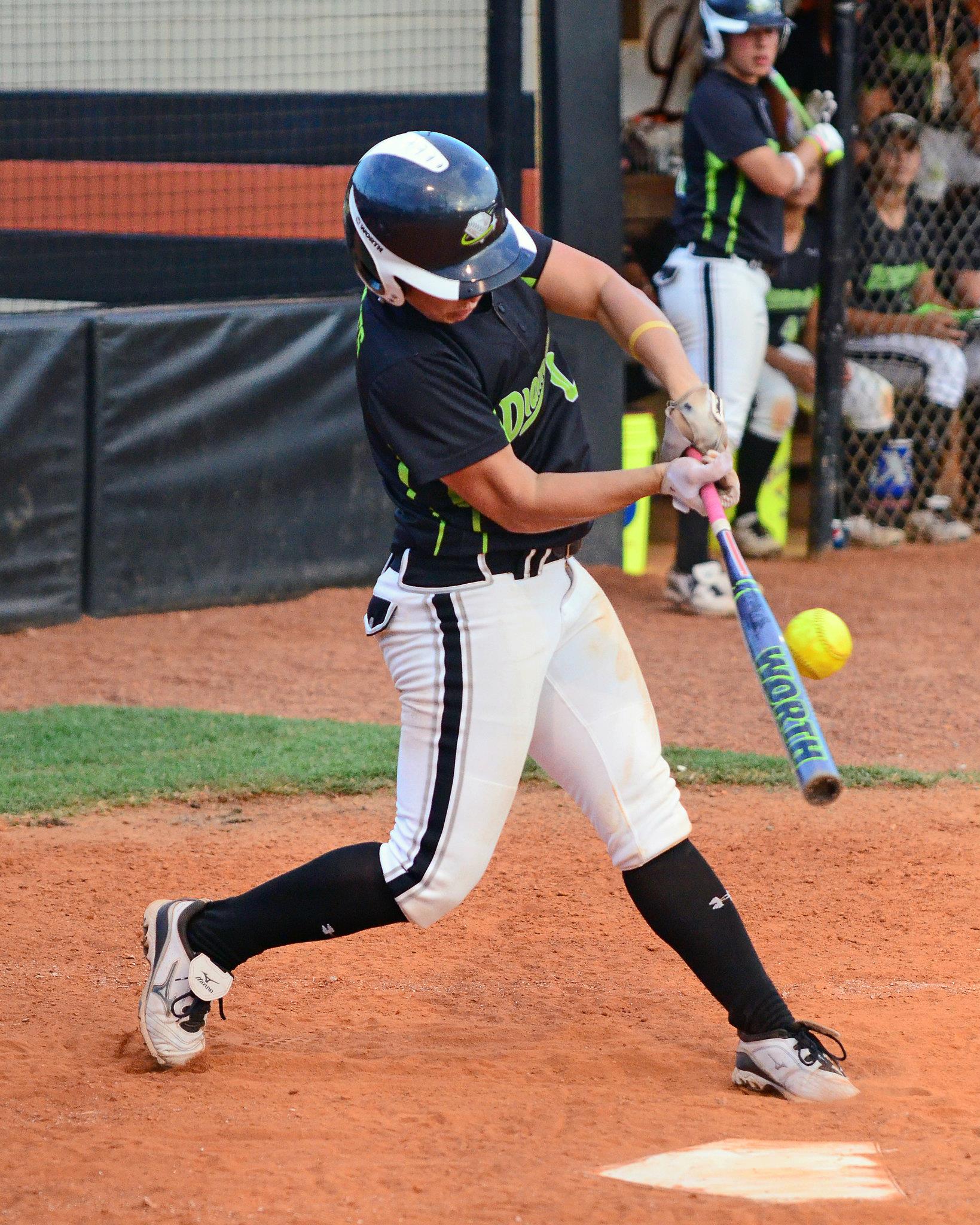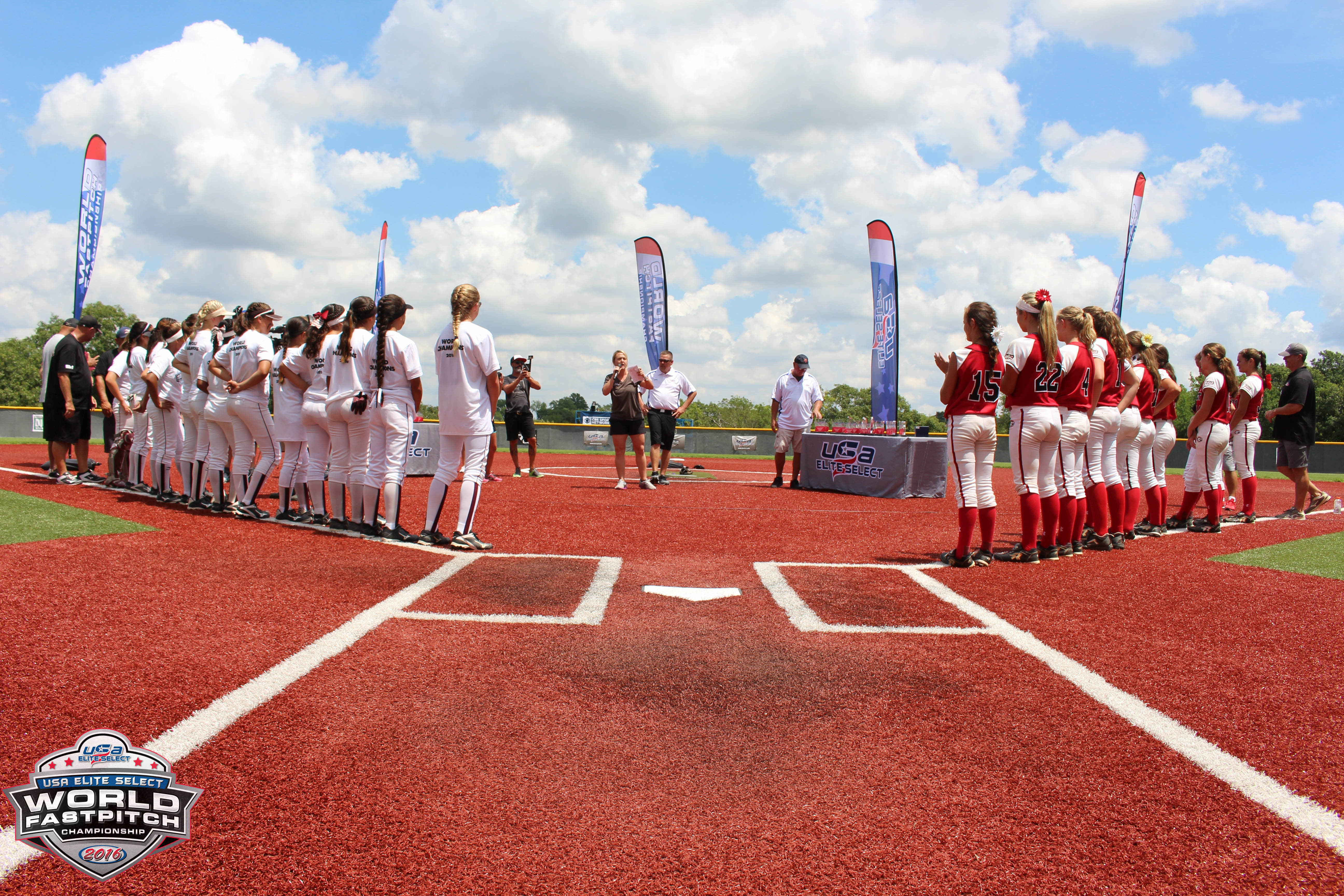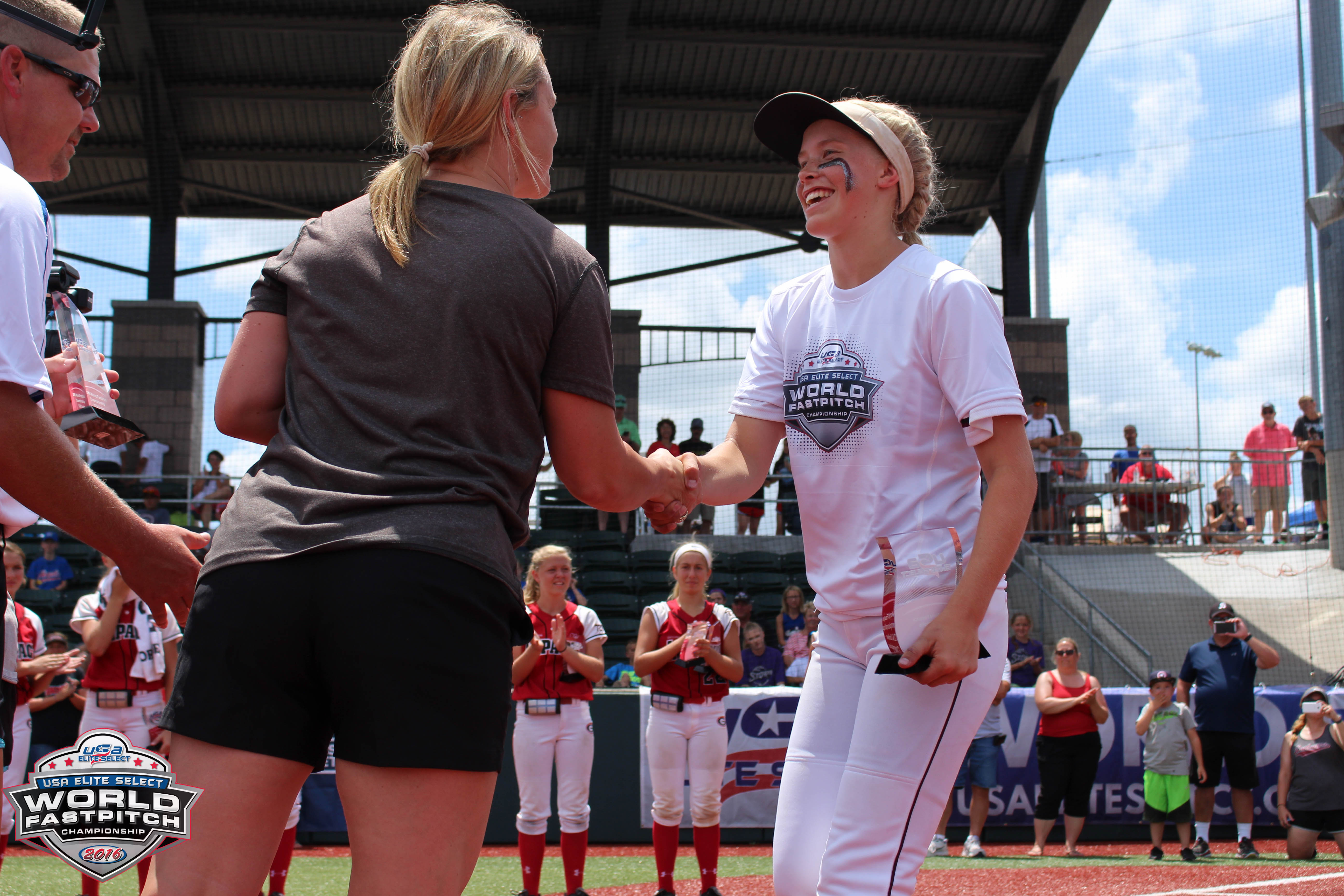2017 World Fastpitch Championship (Shawnee Mission)Jul 3, 2017 by James Caldwell
Jami Lobpries: The Leader Of The Next Generation Of Softball
Jami Lobpries: The Leader Of The Next Generation Of Softball
Jami Lobpries: The Leader Of The Next Generation Of Softball

Jami Lobpries, the Vice President of USSSA Fastpitch, is impacting the sport of softball for the next generation of players.
Call it her mission and purpose.
The driving force for Jami is wanting to create more opportunities for softball players to play professionally.
But, for players who are unable to reach the professional level, she wants to ensure they can use the skills and lessons learned through the game of softball to become difference-makers and influencers in the business world.
 "Increasing opportunities for athletes to continue their careers has always been my passion. That's always been my passion and what drives me," Jami said. "I'm very passionate about growing opportunities for these athletes to have a place to play once they're done with college so their careers don't end at 22."
"Increasing opportunities for athletes to continue their careers has always been my passion. That's always been my passion and what drives me," Jami said. "I'm very passionate about growing opportunities for these athletes to have a place to play once they're done with college so their careers don't end at 22."
Jami played professional softball in the NPF from 2009 to 2012. Then, she was so driven to grow professional opportunities in the sport that she went back to school at Texas A&M, got her Ph.D in sports marketing, and is now leading a softball revolution.
Asked to describe her job as VP of USSSA Fastpitch, Jami says her role is always evolving and covers whatever is needed to grow the sport.
Right now, it's branding and marketing, strategic relationships, and overseeing huge events like the USA Elite Select World Fastpitch Championship running July 10-16 in Kansas City and the Futures World Fastpitch Championship running July 17-23 in Orlando, Florida.


The WFC is designed to showcase elite softball talent from 12U to 18U. The girls in the tournament will be the future of the sport, but Jami also wants to make sure they walk away from the experience with tools to succeed in their future careers.
In only its second year, the tournament has exploded in popularity. Last year, the WFC featured 178 teams. This year, the event is close to the maximum field of 256.
Why is the WFC so important? It highlights the USA Elite Select mission to improve quality of play by giving elite-level players a platform to develop athletically and educationally.

Not only will these elite athletes grow as players at the WFC but they will also take part in education seminars and workshops that will better equip them for college.
Jami wants to make sure the lessons she learned in softball are taught to the next generation: competitiveness, how to handle adversity, working with different people, and succeeding under pressure. It's part of the mission to develop future softball stars and female business leaders.
"I want to be a role model," Jami said. "I want them to see at some of these national tournaments that there is a woman up there who played just like they are. You never know who's watching. I definitely try to be that (role model)."
One of the most important aspects of Jami's role is ensuring competitiveness at the youth level.
USSSA is a sanctioning body and Jami carries the responsibility of overseeing approximately 25,000 fastpitch softball teams across the U.S.
Jami says one of her favorite things about the VP role is ensuring that every player has a place to play. Elite players play other elite players. A Teams play A Teams. C Teams play C Teams.
This system keeps girls in the sport by ensuring players are classified and grouped by skill level. After all, who wants to lose 20-0 every time they set foot on the softball field?
The approach to a national program makes the sport about the athletes to ensure they get the most out of the experience. And, if players reach the elite level, they can participate in events like the WFC to test themselves against players from across the country.
Because the game has evolved to where elite level softball players are starting at 9 and 10 years old, Jami sees her role as being very important to reach girls at this young age.
Call it a gatekeeper for the next generation of players both now and in the future because she wants to ensure the 10U players of today have more opportunities a decade from now.
So, what does the future of the sport look like? Jami foresees softball continuing to grow at a rapid pace and become more global.
The international expansion will be aided by softball returning to the Olympics in 2020. Also, instruction and coaching is expanding to other countries to reach young softball players in Europe and Asia. You can expect to see more of these players coming to the U.S. to play for college and pro softball teams.
Ultimately, though, the goal remains to grow the sport professionally.
The WNBA is celebrating 20 years of professional women's basketball and has 12 teams. Meanwhile, the NPF has plenty of room to grow with only six teams.
By the time the elite U10 players graduate from college, there should be even more professional opportunities.
The key is television exposure. That has helped the college game grow tremendously since the benchmark era of Cat Osterman and Jennie Finch.
Now, even more fans are showing up to college softball games, with individual teams setting attendance records. Plus, the Women's College World Series set another attendance record this year.
Eventually, that growing interest in college softball will spill over to the professional game. And, if the quality continues to improve, more fans will pay to see professional softball because softball is a faster, arguably more exciting extension of a sport that people already know: baseball.
As for the players who will make up the next generation, softball has a cool factor because of increased national exposure, making young girls want to be part of something they can carry for the rest of their lives.
Jami knows it's a matter of continuing to improve the quality of play and quality of the players. It starts at the grassroots level building the future of softball.

"When I think of my role in the sport, I feel blessed to take talents that I learned in school," Jami said.
"When I was playing in the pro league, I wanted to learn how to grow softball. So, I went back to school. It's morphed into this job where I get to sit at a macro level and impact the sport. It is pretty fun to live out that passion of combining my business skills and doing it an environment where I'm so passionate."


Call it her mission and purpose.
The driving force for Jami is wanting to create more opportunities for softball players to play professionally.
But, for players who are unable to reach the professional level, she wants to ensure they can use the skills and lessons learned through the game of softball to become difference-makers and influencers in the business world.
 "Increasing opportunities for athletes to continue their careers has always been my passion. That's always been my passion and what drives me," Jami said. "I'm very passionate about growing opportunities for these athletes to have a place to play once they're done with college so their careers don't end at 22."
"Increasing opportunities for athletes to continue their careers has always been my passion. That's always been my passion and what drives me," Jami said. "I'm very passionate about growing opportunities for these athletes to have a place to play once they're done with college so their careers don't end at 22."Jami played professional softball in the NPF from 2009 to 2012. Then, she was so driven to grow professional opportunities in the sport that she went back to school at Texas A&M, got her Ph.D in sports marketing, and is now leading a softball revolution.
Jami Lobpries Embraces the Challenge of Growing Softball
Asked to describe her job as VP of USSSA Fastpitch, Jami says her role is always evolving and covers whatever is needed to grow the sport.
Right now, it's branding and marketing, strategic relationships, and overseeing huge events like the USA Elite Select World Fastpitch Championship running July 10-16 in Kansas City and the Futures World Fastpitch Championship running July 17-23 in Orlando, Florida.


The WFC is designed to showcase elite softball talent from 12U to 18U. The girls in the tournament will be the future of the sport, but Jami also wants to make sure they walk away from the experience with tools to succeed in their future careers.
In only its second year, the tournament has exploded in popularity. Last year, the WFC featured 178 teams. This year, the event is close to the maximum field of 256.
Why is the WFC so important? It highlights the USA Elite Select mission to improve quality of play by giving elite-level players a platform to develop athletically and educationally.

Not only will these elite athletes grow as players at the WFC but they will also take part in education seminars and workshops that will better equip them for college.
Jami wants to make sure the lessons she learned in softball are taught to the next generation: competitiveness, how to handle adversity, working with different people, and succeeding under pressure. It's part of the mission to develop future softball stars and female business leaders.
"I want to be a role model," Jami said. "I want them to see at some of these national tournaments that there is a woman up there who played just like they are. You never know who's watching. I definitely try to be that (role model)."
USSSA Plays Important Role for Young Softball Players
One of the most important aspects of Jami's role is ensuring competitiveness at the youth level.
USSSA is a sanctioning body and Jami carries the responsibility of overseeing approximately 25,000 fastpitch softball teams across the U.S.
Jami says one of her favorite things about the VP role is ensuring that every player has a place to play. Elite players play other elite players. A Teams play A Teams. C Teams play C Teams.
This system keeps girls in the sport by ensuring players are classified and grouped by skill level. After all, who wants to lose 20-0 every time they set foot on the softball field?
The approach to a national program makes the sport about the athletes to ensure they get the most out of the experience. And, if players reach the elite level, they can participate in events like the WFC to test themselves against players from across the country.
Because the game has evolved to where elite level softball players are starting at 9 and 10 years old, Jami sees her role as being very important to reach girls at this young age.
Call it a gatekeeper for the next generation of players both now and in the future because she wants to ensure the 10U players of today have more opportunities a decade from now.
What is the Future of Softball?
So, what does the future of the sport look like? Jami foresees softball continuing to grow at a rapid pace and become more global.
The international expansion will be aided by softball returning to the Olympics in 2020. Also, instruction and coaching is expanding to other countries to reach young softball players in Europe and Asia. You can expect to see more of these players coming to the U.S. to play for college and pro softball teams.
Ultimately, though, the goal remains to grow the sport professionally.
The WNBA is celebrating 20 years of professional women's basketball and has 12 teams. Meanwhile, the NPF has plenty of room to grow with only six teams.
By the time the elite U10 players graduate from college, there should be even more professional opportunities.
The key is television exposure. That has helped the college game grow tremendously since the benchmark era of Cat Osterman and Jennie Finch.
Now, even more fans are showing up to college softball games, with individual teams setting attendance records. Plus, the Women's College World Series set another attendance record this year.
Eventually, that growing interest in college softball will spill over to the professional game. And, if the quality continues to improve, more fans will pay to see professional softball because softball is a faster, arguably more exciting extension of a sport that people already know: baseball.
As for the players who will make up the next generation, softball has a cool factor because of increased national exposure, making young girls want to be part of something they can carry for the rest of their lives.
Jami knows it's a matter of continuing to improve the quality of play and quality of the players. It starts at the grassroots level building the future of softball.

"When I think of my role in the sport, I feel blessed to take talents that I learned in school," Jami said.
"When I was playing in the pro league, I wanted to learn how to grow softball. So, I went back to school. It's morphed into this job where I get to sit at a macro level and impact the sport. It is pretty fun to live out that passion of combining my business skills and doing it an environment where I'm so passionate."

